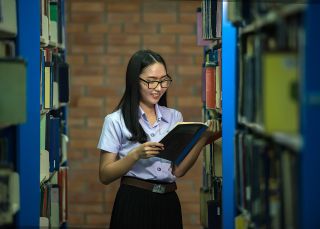Teachers in elementary, middle, and high school grade bands can co-create lessons and projects with their school librarian and media specialist while maximizing technology-rich media and information literacy resources.
One reason why co-teaching works well is because each educator brings their strengths to the lesson. Similarly, when teachers connect, collaborate, and co-create learning activities with librarians and media specialists, deeper learning can happen. And, interdisciplinary content can be worked into more traditional assignments, which can be exciting for students and teachers.
More and more librarians are serving in roles as media specialists, and physical library spaces in schools are transforming into tech centers and makerspaces. In some schools, there are no longer physical library spaces, and librarians and media specialists come to the classrooms for library and information literacy instruction.
To guide this work, the American Association of School Librarians (AASL) provides national school library standards on how to inquire, include, collaborate, curate, and explore as a crosswalk with Future Ready Librarians.
These learning activity ideas align with the “Collaborate” stream focused on educators working together on shared learning goals with students.
Collaborating with School Librarians: Elementary School Lesson
When working with younger students, collaborative efforts work best when families and even the surrounding community are involved. Moreover, using scaffolding techniques, and breaking down content for students, is developmentally appropriate.
An elementary information literacy learning activity can focus on choosing a topic of interest, and using safe and trustworthy sources to search for information about it. The librarian or media specialist’s role can be to prepare mini lessons using Flip on information gathering from trusted and credible sources. Then, in the classroom, the teacher can have students search for information based on the topic being focused on in the class.
For example, in social studies, the students can search for information about the city they live or have visited, or in English language arts, students can gather information on famous poets. The teacher and librarian or media specialist can co-create a template for students to use at home when they are researching information with their families. Families without technology access at home can be encouraged to use the local library.
Middle School Lesson
At the middle school age, students are now switching classes, becoming more independent and responsible for their learning, and consuming technology and social media both during and outside of the school day. All of these things make understanding data privacy and responsible digital engagement imperative.
The librarian or media specialist’s role can be to discuss with students issues of data privacy and how to properly communicate online, using an interactive slide deck through Slido. This discussion can pair seamlessly with a history teacher’s lesson on the Bill of Rights, its interpretations of it, and how this can impact engagement in public online spaces. With the support of both the teacher and librarian or media specialist, students can record a VoiceThread to share their position on the topic and summarize their learning.
High School Lesson
In preparation for career and college, students at the high school level are refining their information literacy skills to conduct research and craft research papers that are supported by cited scholarly sources.
Librarians and media specialists can explain the different types of scholarly sources using a screencast, walking students through the different educational research databases. An English teacher can support students with how to provide in-text and reference page citations following APA or MLA. For coherence and continuity between the library and classroom instruction, students can be encouraged to use a Wakelet to curate all of the information gathered.
The ways that teachers, librarians, and media specialists can work in concert to support students by co-creating engaging learning experiences is endless, and leveraging technology to strengthen information literacy skills across elementary, middle, and high school is a critical part of that effort.

